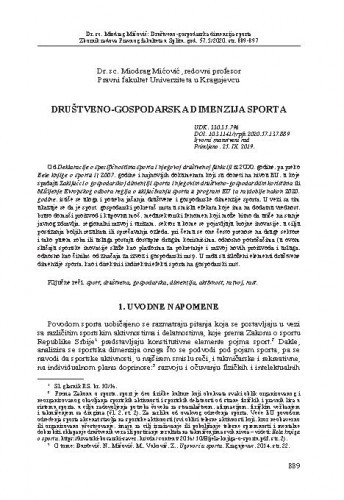Od Deklaracije o specifičnostima sporta i njegovoj društvenoj funkciji iz 2000. godine, pa preko Bele knjige o sportu iz 2007. godine i najnovijih dokumenata koji su doneti na nivou EU, u koje spadaju Zaključci o gospodarskoj dimenziji sporta i njegovim društveno-gospodarskim koristima ili Mišljenje Evropskog odbora regija o uključivanju sporta u program EU za razdoblje nakon 2020. godine, ističe se uloga i potreba jačanja društvene i gospodarske dimenzije sporta. U vezi sa tim ukazuje se da je sport: gospodarski pokretač rasta u smislu efekata koje ima na dodatnu vrednost, bruto domaći proizvod i kupovnu moć; međusektorski fenomen koji može bitno da utiče na stanje javnog zdravlja, regionalni razvoj i turizam; sektor u kome se pojavljuju brojne inovacije, u cilju postizanja boljih rezultata ili sprečavanja ozleda, pri čemu se one često prenose na druge sektore i tako putem roba ili usluga postaju dostupne drugim korisnicima, odnosno potrošačima (u ovom slučaju sportske inovacije služe kao platforma za pokretanje i razvoj novih proizvoda i usluga, odnosno kao činilac od značaja za izvoz i gospodarski rast). U radu su izloženi elementi društvene dimenzije sporta, kao i direktni i indirektni efekti sporta na gospodarski rast.; The role of sport and the need to strengthen the social and economic dimension of sport has been emphasized in numerous documents adopted at the EU level, starting with the Declaration on the specific characteristics of sport and its social function in Europe which was adopted in 2000, through the White Paper on Sport (2007/2261(INI)) and the latest EU documents including Conclusions on the economic dimensions of sport and its socio-economic benefits or Opinion of the European Committee of the Regions — Mainstreaming sport into the EU agenda post-2020. In this regard, it is pointed out that sport represents: an economic driver of growth in terms of the effects it has on the added value; gross domestic product and purchasing power; cross-sectoral phenomenon that can significantly affect the state of public health, regional development and tourism; a sector in which numerous innovations appear in order to achieve better results or to prevent injuries, whereby they are often transferred to other sectors and thus become available to other users or consumers through goods or services (in this case, sports innovations serve as a platform for launching and the development of new products and services, or as a factor of importance for exports and economic growth). The paper presents elements of the social dimension of sport, as well as the direct and indirect effects of sports on economic growth.
Sažetak

 Zbornik radova Pravnog fakulteta u Splitu : 57, 3(2020) / glavni i odgovorni urednik Arsen Bačić.
Zbornik radova Pravnog fakulteta u Splitu : 57, 3(2020) / glavni i odgovorni urednik Arsen Bačić.